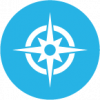The Untapped Treasure Trove: Establishing an Enduring Space for Connection through a Thriving University-Wide Community of Practice for Online Learning Professionals
Concurrent Session 9

Brief Abstract
Come learn how we uncovered an embarrassment of riches by building a community of practice (CoP) in a university of highly-skilled but siloed instructional design, academic services, and media professionals which provided an inclusive professional space within our institution. What hidden treasures can your university offer you?
Presenters

.jpg?itok=347DmyFt)

Extended Abstract
During this session, we will:
-
Share the history of our community of practice (CoP), the Instructional Innovation Committee (IIC), including its various phases of development: including grassroots organization to formalization efforts to establishment as a formal university entity, and now our strategic and transformative phase.
-
Describe how our CoP supports educational technology and instructional design professionals across our University to help their schools meet various elements of the OLC Quality Scorecard, Quality Matters, and other measures of blended and online program academic program quality.
-
Explore the CoP benefits and challenges for the university, schools, and individuals.
-
Lead a discussion regarding strategies for CoP development.
Why it is relevant or important to the community:
Learning professionals looking for strategies to break down silos, work with related job roles and levels across the academic innovation and teaching and learning spectrum may be interested in this session. This CoP embraces the opportunity to connect frontline educational technology and instructional design professionals with administrative leadership and interconnected departments and services such as libraries and disability support services. This inclusivity across university functionality, all focused on excellence in online teaching an learning, has proven to be a great strength and solutions-generation engine for the university as a whole. Generalizable steps and lessons learned will be shared with attendees that may also be interested in starting a similar approach.
Plan for Interactivity:
The session will three clear interactivity breaks throughout the presentation.
-
Session Grounding/Reflection: Pool of organizational reflection questions for participants included in the planning worksheet that will be provided:
-
What are you hoping to take away from this presentation?
-
Does your institution promote a community of practice?
-
-
Group Discussion - benefits, challenges, strategies for CoP development
-
Session Conclusion - Takeaway: A planning worksheet that participants can take away to start thinking about forming similar CoPs in their own institutions.
Takeaways:
-
It is possible to create an enduring CoP at a very large silo-ed organization (building something from nothing).
-
Woksheet/ doc for attendees
-
Ideas for where a developed CoP can go to within a large institution to help schools meet their missions.


